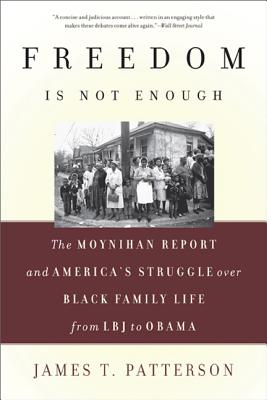Freedom Is Not Enough: The Moynihan Report and America's Struggle Over Black Family Life--From LBJ to Obama

Freedom Is Not Enough: The Moynihan Report and America's Struggle Over Black Family Life--From LBJ to Obama
In Freedom is Not Enough, award-winning historian James Patterson narrates the birth, life, and afterlife of the explosive Moynihan report, which altered the way we view race in America. In 1965, President Johnson was leading an optimistic nation toward progress, especially in regard to the civil rights movement, which had just achieved the landmark Civil Rights Act of 1964. But this momentum was quickly lost, in part due to the negative reception of Daniel Patrick Moynihan's Report on Black Family Life. Moynihan marshaled a formidable array of alarming statistics to paint a grim portrait of inner-city black family life, and argued that immediate national action was imperative if America hoped to prevent lower-class black families from crumbling. So pivotal was the Moynihan report that the past half-century of race relations cannot be fully comprehended without considering its role in predicting--yet falling short of averting--decades of failure. Freedom Is Not Enough provides invaluable new insight into this crucial moment in American history, showing how the Moynihan report represents one of the great missed opportunities in 20th century American history.
On June 4, 1965, President Lyndon Johnson delivered what he and many others considered the greatest civil rights speech of his career. Proudly, Johnson hailed the new freedoms granted to African Americans due to the newly passed Civil Rights Act and Voting Rights Act, but noted that "freedom is not enough." The next stage of the movement would be to secure racial equality "as a fact and a result." The speech was drafted by an assistant secretary of labor by the name of Daniel Patrick Moynihan, who had just a few months earlier drafted a scorching report on the deterioration of the urban black family in America. When that report was leaked to the press a month after Johnson's speech, it created a whirlwind of controversy from which Johnson's civil rights initiatives would never recover. But Moynihan's arguments proved startlingly prescient, and established the terms of a debate about welfare policy that have endured for forty-five years. The history of one of the great missed opportunities in American history, Freedom Is Not Enough will be essential reading for anyone seeking to understand our nation's ongoing failure to address the tragedy of the black underclass.
On June 4, 1965, President Lyndon Johnson delivered what he and many others considered the greatest civil rights speech of his ca
PRP: 145.43 Lei
Acesta este Prețul Recomandat de Producător. Prețul de vânzare al produsului este afișat mai jos.
130.89Lei
130.89Lei
145.43 LeiLivrare in 2-4 saptamani
Descrierea produsului
In Freedom is Not Enough, award-winning historian James Patterson narrates the birth, life, and afterlife of the explosive Moynihan report, which altered the way we view race in America. In 1965, President Johnson was leading an optimistic nation toward progress, especially in regard to the civil rights movement, which had just achieved the landmark Civil Rights Act of 1964. But this momentum was quickly lost, in part due to the negative reception of Daniel Patrick Moynihan's Report on Black Family Life. Moynihan marshaled a formidable array of alarming statistics to paint a grim portrait of inner-city black family life, and argued that immediate national action was imperative if America hoped to prevent lower-class black families from crumbling. So pivotal was the Moynihan report that the past half-century of race relations cannot be fully comprehended without considering its role in predicting--yet falling short of averting--decades of failure. Freedom Is Not Enough provides invaluable new insight into this crucial moment in American history, showing how the Moynihan report represents one of the great missed opportunities in 20th century American history.
On June 4, 1965, President Lyndon Johnson delivered what he and many others considered the greatest civil rights speech of his career. Proudly, Johnson hailed the new freedoms granted to African Americans due to the newly passed Civil Rights Act and Voting Rights Act, but noted that "freedom is not enough." The next stage of the movement would be to secure racial equality "as a fact and a result." The speech was drafted by an assistant secretary of labor by the name of Daniel Patrick Moynihan, who had just a few months earlier drafted a scorching report on the deterioration of the urban black family in America. When that report was leaked to the press a month after Johnson's speech, it created a whirlwind of controversy from which Johnson's civil rights initiatives would never recover. But Moynihan's arguments proved startlingly prescient, and established the terms of a debate about welfare policy that have endured for forty-five years. The history of one of the great missed opportunities in American history, Freedom Is Not Enough will be essential reading for anyone seeking to understand our nation's ongoing failure to address the tragedy of the black underclass.
On June 4, 1965, President Lyndon Johnson delivered what he and many others considered the greatest civil rights speech of his ca
Detaliile produsului










